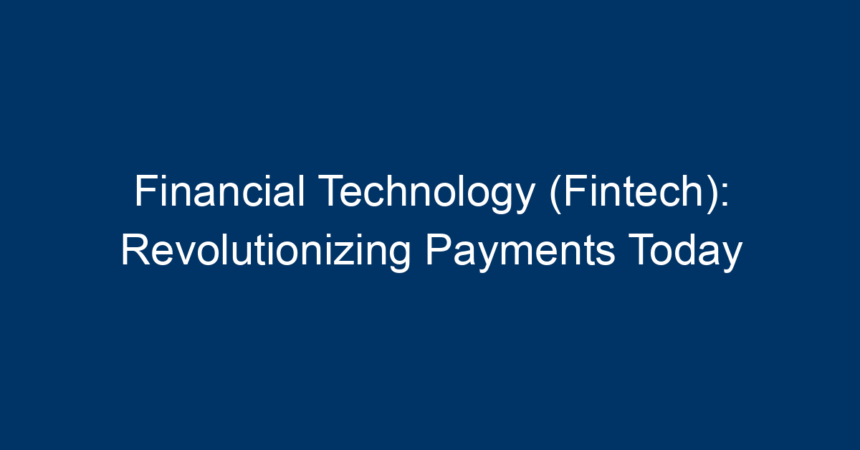In today’s fast-paced digital landscape, financial technology (fintech) has emerged as a game-changer, especially in the realm of payments. Traditional banking systems, once the norm, are becoming increasingly obsolete as consumers and businesses alike seek faster, more efficient ways to handle their finances. Whether it’s through peer-to-peer payment systems or sophisticated blockchain technology, fintech is shaping how we think about money and transactions. This article delves into how financial technology is revolutionizing payments today, its impact on industries, and what the future holds.
Understanding Financial Technology (Fintech)
Financial technology (fintech) encompasses a broad spectrum of innovative technologies that enhance, automate, or innovate financial services. From mobile banking and investment apps to cryptocurrencies and crowdfunding platforms, the fintech revolution has redefined the way people manage their money. At its core, fintech aims to make financial systems more accessible, efficient, and user-friendly.
The Evolution of Payments in Financial Technology
Historically, making a payment involved slow processes, lengthy queues, and unnecessary paperwork. The emergence of fintech has dramatically transformed this experience, leading to the development of various payment systems.
The Rise of Digital Payments
The shift towards digital payments can be attributed to several factors, including the proliferation of smartphones, increased internet accessibility, and the demand for speed and convenience. Services such as PayPal, Venmo, and Square have made it easier for users to send and receive money instantaneously, eliminating many barriers associated with traditional banking.
Contactless Payments and NFC Technology
Contactless payment methods, powered by Near Field Communication (NFC) technology, allow consumers to make payments by simply tapping their phones or cards at terminals. This method has gained immense popularity, especially during the COVID-19 pandemic, when people sought contactless solutions to minimize physical interactions.
Cryptocurrency: A New Frontier
Cryptocurrencies like Bitcoin and Ethereum have brought about a revolution in the financial landscape. They offer decentralized payment solutions that are transparent and often lower-cost compared to traditional systems. With the rise of blockchain technology, transactions can be verified without the need for intermediaries, reducing fees and increasing transaction speed.
The Benefits of Financial Technology in Payments
As we delve deeper into the impact of fintech, it’s crucial to highlight the benefits that come with this digital transformation.
Increased Efficiency
Fintech solutions streamline payment processes, significantly reducing transaction times. Instead of waiting days for funds to clear, users can enjoy instant transactions, leading to improved cash flow for both businesses and consumers.
Enhanced Security
Security is often a concern when it comes to digital payments. However, fintech companies employ advanced encryption techniques and security protocols to protect users’ financial information. Biometric authentication, two-factor authentication, and blockchain technology enhance security measures further.
Broader Accessibility
One of the most significant advantages of financial technology (fintech) is its ability to provide financial services to unbanked and underbanked populations. With just a smartphone and internet access, individuals in remote areas can transact, save, and access credit, promoting financial inclusion.
Lower Costs
Fintech companies typically have lower operational costs compared to traditional banks, allowing them to offer more competitive fees and interest rates. This affordability extends to consumers, who benefit from reduced transaction costs and enhanced financial products.
Challenges and Regulatory Considerations
Despite its many benefits, the rapid growth of fintech has also presented challenges that require careful navigation.
Regulatory Compliance
The fintech sector is subject to various regulations aimed at protecting consumers and ensuring the stability of the financial system. As fintech companies innovate, they must also stay aware of regulatory changes, which can differ by region and affect their operations.
Fraud and Cybersecurity Risks
As with any digital transaction, cybersecurity remains a significant concern. The rise of digital payment methods has also led to an increase in fraud attempts, making it imperative for fintech companies to invest heavily in cybersecurity measures and stay ahead of emerging threats.
Market Competition
The proliferation of fintech startups has intensified competition, not just among these companies but also against traditional financial institutions. This competition can lead to innovations but may also pose risks if companies prioritize speed over security and compliance.
The Future of Financial Technology in Payments
As we look towards the future, several trends indicate how financial technology (fintech) will continue to reshape the payments landscape.
Expansion of Artificial Intelligence (AI) and Machine Learning
AI is set to play a transformative role in the realm of payments. From enhancing fraud detection to personalizing user experiences, AI algorithms can analyze vast amounts of data to enable more insightful decision-making and improved customer service.
The Growth of Decentralized Finance (DeFi)
DeFi platforms are gaining traction, enabling users to lend, borrow, and trade assets without intermediaries. This movement could challenge traditional banking systems and fundamentally alter the financial landscape.
Integration with Blockchain
Blockchain technology will likely continue its integration into fintech applications, providing increased transparency and reduced processing times for transactions. With the rise of Central Bank Digital Currencies (CBDCs), financial institutions are exploring blockchain’s potential to streamline national currency transactions.
Focus on Sustainability
With growing awareness around sustainability, fintech companies are expected to adopt eco-friendly practices and support green initiatives. This alignment with social responsibility could reshape customer expectations and loyalty in the sector.
Actionable Insights for Businesses and Consumers
As financial technology (fintech) increasingly influences the payments landscape, both businesses and consumers must adapt to thrive.
For Businesses
-
Adopt Digital Payments: Embrace fintech solutions to streamline your payment processes, enhance customer experiences, and reduce costs.
-
Invest in Cybersecurity: Protect your business and customers by investing in robust cybersecurity measures. Regularly update your systems and conduct audits to identify vulnerabilities.
- Stay Informed: Keep up with regulatory changes and emerging trends in the fintech sector. This knowledge can help you remain competitive and compliant.
For Consumers
-
Explore Fintech Apps: Leverage fintech applications to manage your finances more efficiently. Consider using budgeting apps or investment platforms that align with your financial goals.
-
Prioritize Security: Use two-factor authentication and unique passwords for all financial apps. Stay vigilant against phishing scams and suspicious activities.
- Educate Yourself: Understanding the features and risks associated with various fintech solutions will allow you to make informed financial decisions.
Conclusion
Financial technology (fintech) is undoubtedly revolutionizing the way we make payments today. By enhancing efficiency, security, and accessibility, fintech is paving the way for a future where financial services are more inclusive and user-friendly. While challenges remain, the continuous evolution of fintech promises exciting opportunities for both businesses and consumers alike. Embrace this shift; the future of payments is here, and it’s more innovative than ever.




